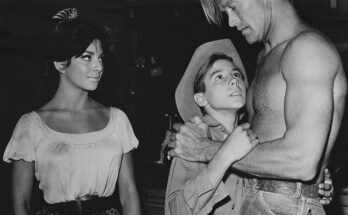Brooke stood in the doorway of her grandfather’s bedroom, her heart heavy with memories. The room still carried the familiar scents of old books, pipe tobacco, and his Aqua Velva aftershave. It felt strange, standing there, knowing her grandfather was truly gone. As her gaze wandered around the room, it landed on a framed photo of her parents on the nightstand. The thought of them brought a deep ache. They had died years ago in a car accident, and now she was truly alone.
Her mind drifted back to all the times her grandfather, Charles, had warned her never to touch his bed, especially the mattress. “It’s got more secrets than you can imagine,” he would say whenever she, as a child, playfully jumped on it. That cryptic statement echoed in her mind as she stood before the bed. Driven by curiosity and a strange sense of duty, she decided to lift the mattress, expecting nothing more than maybe a few old letters.
What she found changed everything. Beneath the mattress lay a small leather-bound book, yellowed newspaper clippings, and a stack of photographs. The sight of these items left her breathless. What had her grandfather been hiding? She carefully picked up the documents and began to sift through them. The more she read, the more her confusion turned to shock. Her grandfather had been investigating her parents’ death for years, suspecting foul play. Despite being a retired cop himself, he believed the investigation into the accident was corrupt, especially regarding how the police had handled it.
As she read the newspaper clippings, one detail stood out: a man named Mr. Johnson had been seen leaving a local lounge, intoxicated, the night of the accident. An officer had waved him through a checkpoint. Brooke’s hands trembled. Her grandfather’s suspicions had been right all along. Her parents’ death hadn’t been a random accident—it had been covered up to protect someone powerful. Hot tears stung her eyes, but she steeled herself. She wasn’t going to break down. Instead, she made a silent vow to finish what her grandfather had started and expose the truth.
Determined, Brooke took the evidence to the local newspaper office the next day. She found herself sitting in front of an editor named Frank, laying out the details her grandfather had uncovered. Initially skeptical, Frank’s expression shifted to one of intrigue as Brooke explained the depth of the cover-up. After hearing everything, he leaned forward and asked if she was truly ready for the consequences of going public with the story. People might try to discredit her, or worse.
Brooke’s resolve didn’t waver. She was tired of living with unanswered questions about her parents’ death. This wasn’t just about her anymore. It was about ensuring that no one else in the town would suffer the same injustice. With that, the editor agreed to run the story.
The article hit the front page a week later, sparking a firestorm of public outrage. Brooke’s phone buzzed endlessly with messages of support and anger at the corruption the article exposed. As pressure mounted, the police department had no choice but to reopen the case. The revelations that followed were shocking. The officer who had been responsible for the original investigation admitted under questioning that they had been ordered to cover up Mr. Johnson’s role due to his family’s wealth and influence.
As the investigation unraveled, so did the town’s patience. Protesters gathered outside the police station and even at the Johnson family’s properties, demanding justice. The Johnson family, in turn, tried to discredit Brooke, but the community rallied behind her. The weight of public support grew stronger with each passing day, making it impossible for the authorities to sweep things under the rug.
Despite attempts to buy silence, Brooke remained steadfast. She refused any offers of settlement, determined to see the case through to the end. At the trial, Brooke sat in the courtroom, her emotions a whirlwind as she testified about the pain and loss her family had endured. She spoke not just for herself, but for everyone who had ever been forced to accept injustice. When Mr. Johnson finally stood and apologized, it felt hollow. Brooke’s fight had never been about apologies; it had always been about justice.
When the verdict came back guilty, a wave of relief washed over her. Justice had been served, not just for her parents, but for the whole town. In the aftermath, sweeping changes were made in the police department, with several corrupt officers fired and new policies implemented to ensure greater accountability.
As life slowly returned to normal, Brooke felt a deep sense of fulfillment. The fight had been hard, but it was worth it. Now, as she looked toward the future, she couldn’t help but wonder if she might help others find the justice they deserved too.


